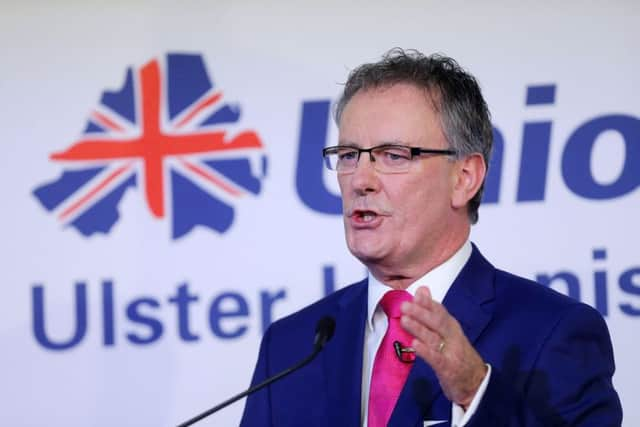Mike Nesbitt: Some unionists are now weighing up Irish unity
and live on Freeview channel 276
Mike Nesbitt, who stepped down as Ulster Unionist leader almost two years ago but remains an MLA, said that many people in Northern Ireland feel “diminished” as a result of Brexit and he suggested that it may be the biggest own goal by unionists since the creation of Northern Ireland almost a century ago.
Mr Nesbitt’s comments were made during a podcast interview with the Think32 campaign group which was founded last year to promote a debate about Irish unity.
Advertisement
Hide AdAdvertisement
Hide AdThe former journalist, whose father’s linen business was destroyed by an IRA bomb, told the group: “The biggest obstacle to a united Ireland as I was growing up was the IRA because that was about coercion”. However Mr Nesbitt said that he was “realistic” about the current situation and added: “I do wonder whether Brexit will prove to be the biggest own goal in 100 years from unionists.


“I know a lot of the emphasis is on the border and on tariff and on trade - and these things are important and need to be resolved - but the other issue is identity.
“The Belfast Agreement made very clear that we all self-define in identity and we can be British or Irish or both...I know there are a lot of people who feel they were diminished on 24 June 2016 by that result for Brexit and a lot of them believe that what happened there was that English nationalists came in over their heads and did exactly what the Agreement said couldn’t happen - denied them their sense of being European. They feel diminished and the consequence is that the constitutional question is back on the table for the first time in 20 years. Where it leads, nobody knows.”
Mr Nesbitt backed remain in the referendum but saw his party divided on the issue.
Advertisement
Hide AdAdvertisement
Hide AdAppealing to nationalists, he said: “If you’re going to have a border poll...don’t let it be like Brexit. Before there’s a border poll it has to be spelled out in enormous detail – and truthfully, unlike Brexit – ‘these are the implications should you choose to vote for constitutional change’.”
Citing practical issues from the nature of the health service to the sort of police force which would operate after a vote for Irish unity, Mr Nesbitt said it was the responsibility of those arguing for an end to partition to explain what it would mean in practical terms.
But although the Strangford MLA made clear that he continued to firmly believe in the Union and that it was up to nationalists to convince him otherwise, he added: “I know of people from a unionist background who are now basically thinking the unthinkable and just basically asking the question ‘would I be better off or worse off?’”
Mr Nesbitt said that his fear for unionism was that as well as Brexit being an “own goal”, the wider social and political environment is changing but unionism might not be reacting quickly enough to the altered landscape.
Advertisement
Hide AdAdvertisement
Hide AdThe former victims’ commissioner said he accepted that in any border poll if either side got 50% plus one then they would be the winner. However, he said that such a scenario would be a “disaster” and a decisive result would be far better.